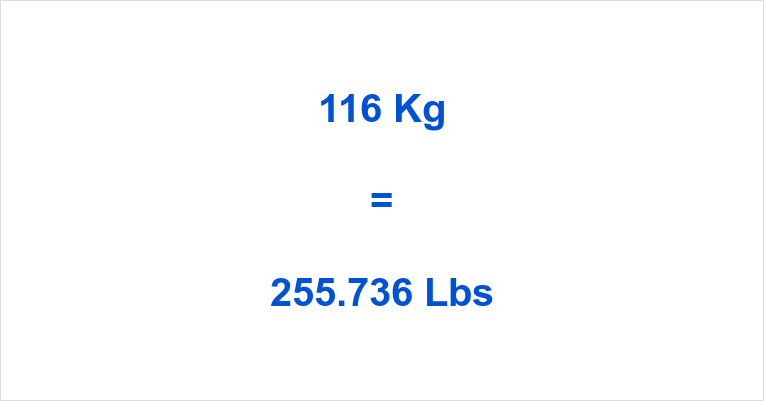Welcome 116 kg to lbs to the world of conversions, where numbers take on new dimensions and weights become more than just measurements! Today, we’re diving into the fascinating realm of converting kilograms to pounds. Whether you’re a math enthusiast or simply someone who wants to make sense of those weighty figures, this blog post is for you.
In this article, we’ll unravel the mystery behind 116 kg and its equivalent in pounds. We’ll explore various methods for accurate conversion, share practical tips for using conversions in your daily life, and highlight some common mistakes to avoid along the way. So fasten your seatbelts as we embark on a journey through numbers – it’s going to be an enlightening ride!
Understanding the Conversion: What is a Kilogram and Pound?
When it comes to understanding the conversion from kilograms to pounds, it’s essential to have a grasp of what these units actually represent. Let’s start with the kilogram (kg). The kilogram is the base unit of mass in the International System of Units (SI), and it is commonly used for measuring weight across many countries worldwide.
On the other hand, we have pounds. Pound (lb) is a unit of weight widely employed in the United States and several other countries. While both kilograms and pounds measure weight, they do so using different scales.
One kilogram is equivalent to 2.20462 pounds. So if you ever come across an intriguing figure like 116 kg, you can easily convert it into pounds by multiplying it by 2.20462.
Understanding these conversions becomes particularly useful when dealing with international travel or even just online shopping where products may be listed in either kilograms or pounds.
By familiarizing ourselves with these basic measurements, we gain a clearer understanding of how weights are expressed and can confidently navigate between different measurement systems without any confusion or miscalculations.
The Importance of Accurate Conversions
Accurate conversions play a crucial role in our daily lives, whether we realize it or not. From measuring ingredients for a recipe to calculating medication dosages, precision is key. Imagine baking a cake and adding the wrong amount of flour because you didn’t convert the measurements correctly – disaster! That’s why understanding and performing accurate conversions is so important.
One area where accurate conversions are particularly essential is weight measurement. Whether you’re trying to track your fitness progress or needing to know the weight limit for luggage on an upcoming trip, being able to convert between kilograms (kg) and pounds (lbs) accurately can make all the difference.
But why is accuracy so vital when it comes to converting measurements? Well, even a small error in conversion can lead to significant discrepancies. Just imagine if your scale said you weighed 116 kg but you mistakenly thought that was equivalent to only 100 lbs instead of approximately 255 lbs! This could have serious implications for health monitoring or meeting weight restrictions.
To ensure precise conversions, it’s essential to use reliable conversion factors specific for kilograms and pounds. Many online tools or conversion apps can assist with this process by providing instant and accurate results. Additionally, double-checking your calculations using multiple sources can help verify accuracy.
By mastering accurate conversions between kilograms and pounds, you’ll be better equipped in various aspects of life – from shopping for produce at the grocery store (where weights may be listed in either unit), to following international recipes that use different units than what you’re familiar with.
The ability to perform precise conversions also opens up opportunities beyond weight measurements alone. Converting between different units allows us greater flexibility when comparing values across systems of measurement. This skill becomes especially useful when dealing with scientific data analysis or engineering projects where diverse units are involved.
Accuracy matters greatly when it comes to converting measurements like 116 kg into lbs – both in terms of avoiding mistakes in everyday situations as well as enabling us to navigate more complex scenarios. So, the next time you need to convert











